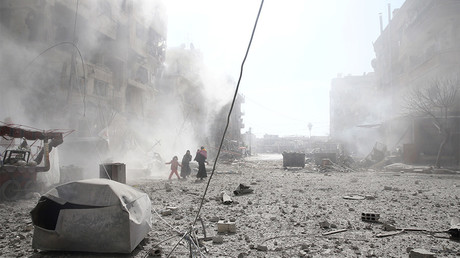The leaders of militant units controlling the East Ghouta suburb of Damascus might be “preparing a provocation that will involve the use of chemical weapons,” Maj. Gen. Yury Yevtushenko said in a briefing on Sunday, citing intelligence obtained by the Russian Center for Reconciliation in Syria.
Just hours after the warning, reports emerged that several people in East Ghouta suffered symptoms consistent with exposure to chlorine gas, conveniently supported by images from the White Helmets group, known for its unique ability to appear at the right place just in time to film civilian suffering, which is later pinned on the Syrian government forces. For their virtuoso work, the controversial UK-backed NGO, also known as the Syria Civil Defense, were even awarded a Hollywood Oscar, despite being plagued by allegations of having ties with terrorists.
The allegations of Damascus’ involvement in yet another chemical attack on civilians coincide with the adoption of the UN Security Council resolution to impose a 30-day ceasefire in Syria, which does not apply to members of the Islamic State (IS, formerly ISIS/ISIL), al-Nusra or any other terrorist organization. Following prolonged and heated debates at the UN, in which Russia insisted that the resolution’s text be altered so that Damascus is not painted as the sole party to blame for the violence, the resolution was unanimously adopted on Saturday.
However, the militants in control of East Ghouta have completely disregarded the humanitarian pause, having unified their command to continue harassing the local population and shelling Damascus. “The situation continues to deteriorate in East Ghouta where Jaysh al-Islam, Jabhat al-Nusra, Ahrar al-Sham, Faylaq al-Rahman, and Fajr al-Ummah Brigade set up a united coordination center,” Yevtushenko said.
The Russian Reconciliation Center noted that the militant groups impede provision of humanitarian aid to East Ghouta and block civilians from leaving the suburb, basically keeping hundreds hostage, including women and children.
“Despite the statements made by Jaysh Al-Islam about reconciliation, the mortar shelling of Damascus continues from the territory controlled by the formations of this group,” the Russian military spokesman said, noting that, over the past 24 hours, at least 31 shells were fired from East Ghouta into residential districts of Damascus. On top of the widespread damage caused by the attacks, at least 13 civilians and one Syrian soldier were injured.
The terrorists also tried to stage a car bomb attack near the town of Qaboun, a suburb of Damascus, an attempt foiled by Syrian armed forces. According to the Russian military, the explosives-laden vehicle came from the areas controlled by Failak Ar-Rahman and al-Nusra militants.
For over a week the Syrian government forces have been carrying out operation Damascus Steel, to clear East Ghouta of illegal Islamist units that have been terrorizing the locals for years, and who have rejected any initiatives to lay down their arms and leave the area. As tensions continue to run high in East Ghouta, despite the agreed ceasefire, the Russian Center for Reconciliation in Syria urged the warring parties to “stop any combat actions and armed provocations.”
This is not the first time that reports of a chlorine gas attack have emerged from the enclave on the outskirts of the Syrian capital. Previous incidents allegedly occurred in January, just before various factions of Syrian society gathered for the Syrian National Congress in Sochi, Russia. The US Secretary of State at the time used the reports to blame Russia for all the chemical weaponry-related incidents in Syria, regardless of who actually conducted it. The Russian Foreign Ministry slammed the insinuations as a “massive propaganda attack” aimed at undermining efforts for a peaceful settlement in Syria.
The US has repeatedly warned that it may conduct more direct air strikes against Syrian forces if chemical weapons are used in the country. Last April President Donald Trump ordered Tomahawk missile strikes on Shayrat Airbase, in response to a chemical attack in Idlib, which the US, without a single shred of evidence, immediately pinned on President Bashar Assad. French President Emmanuel Macron also promised to “strike” Syria if any evidence emerges that chemical weapons are being used against civilians.
Russia has repeatedly drawn the international community’s attention to incidents involving the use of chemical weapons in Syria, and has consistently called for independent and impartial investigations into the matter. Last month Moscow again proposed a mechanism to replace the Joint Investigative Mechanism (JIM) of the Organization for the Prohibition of Chemical Weapons (OPCW), whose mandate expired in November. Previously, JIM handled UN investigations into the use of chemical weapons in Syria but, according to Russian officials, has failed to produce objective reports on chemical attacks, including the April incident in Khan Shaykhun. Instead, Moscow has been proposing to establish an objective investigative mechanism to probe all allegations of chemical attacks in Syria “based on impeccable and irrefutable data,” rather than on cherry-picked facts and accounts by partisan sources.
Think your friends would be interested? Share this story!
Source Article from https://www.rt.com/news/419805-ghouta-militants-shelling-provocations/?utm_source=rss&utm_medium=rss&utm_campaign=RSS
Related posts:
Views: 0
 RSS Feed
RSS Feed















 February 26th, 2018
February 26th, 2018  Awake Goy
Awake Goy 


 Posted in
Posted in  Tags:
Tags: 
















